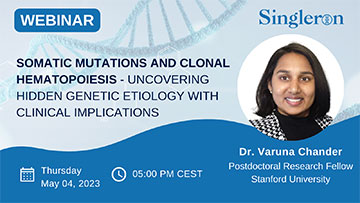
Clonal Hematopoiesis of Indeterminate Potential (CHIP) is a condition related to aging, characterized by the accumulation of somatic mutations in hematopoietic stem cells during middle age. The mutations are not cancerous but associated with an increased risk of developing blood cancer or cardiovascular disease. They are often somatic and arise due to a number of factors, including exposure to environmental toxins, aging, and other genetic or epigenetic changes.
In this webinar, you will learn about:
- Somatic mosaicism and its impact on development and aging.
- Clonal hematopoiesis (CHIP) and its role in the development of cancer and cardiovascular disease.
- A case study characterizing somatic mosaic markers in the blood of cardiovascular disease patients.
- Future Directions: Detection of CHIP using single cell sequencing approaches
Singleron cordially invites you to our webinar.
Thursday, May 4, 2023 at 17:00 (CEST)
About the speaker:
Dr. Varuna Chander is a postdoctoral researcher at Stanford University, specializing in genomics and bioinformatics. She holds a BTech and Masters in Industrial Biotechnology, and has experience in early-stage sequencing product development. Dr. Chander earned her PhD in Genetics and Genomics from the Human Genome Sequencing Center at Baylor College of Medicine, where she was awarded the NLM Biomedical Informatics and Data Science Fellowship for three years. Her research focused on investigating the molecular causes of rare diseases and also the relationship between somatic mutations in blood and cardiovascular disease risk. Alongside her research, Dr. Chander collaborated on multiple projects, employing cutting-edge computational methods to examine the role of structural variation in genetic diseases. Currently, she works with Michael Snyder at Stanford University, integrating machine learning approaches with genetic, multi-omic, and clinical data to study the genomic basis of complex human diseases.




